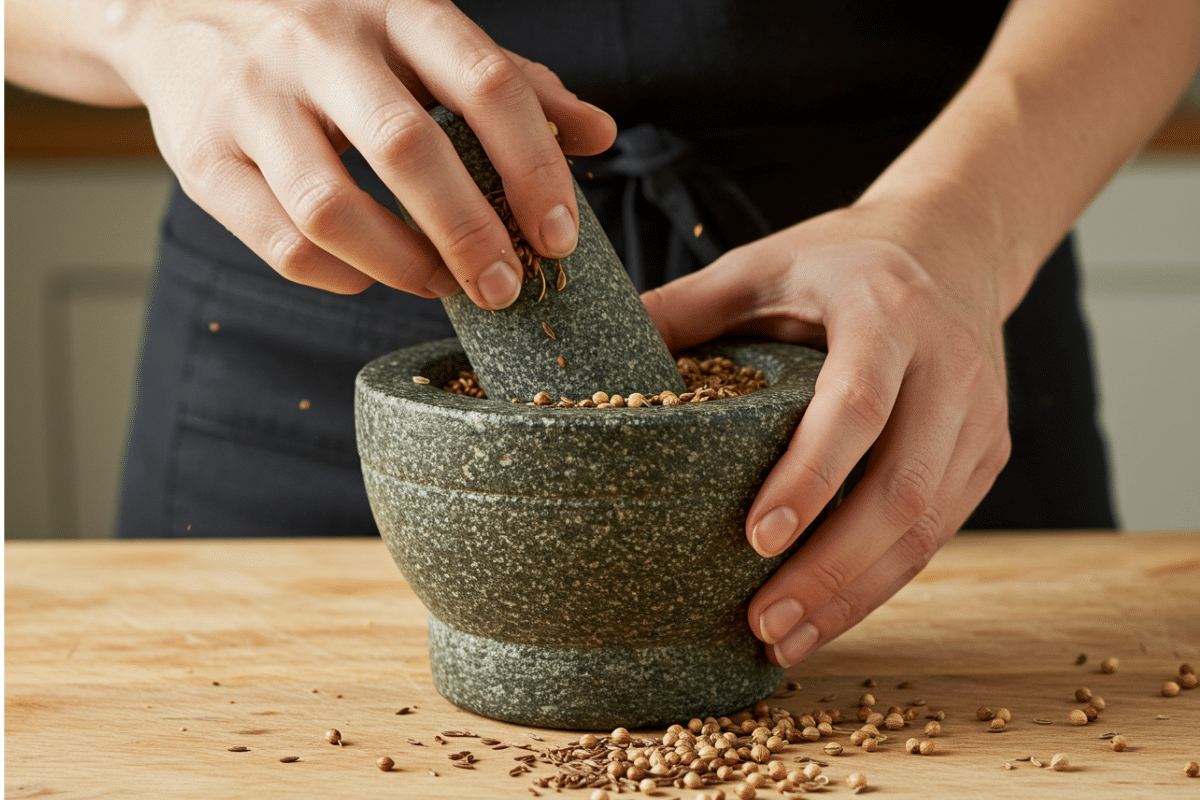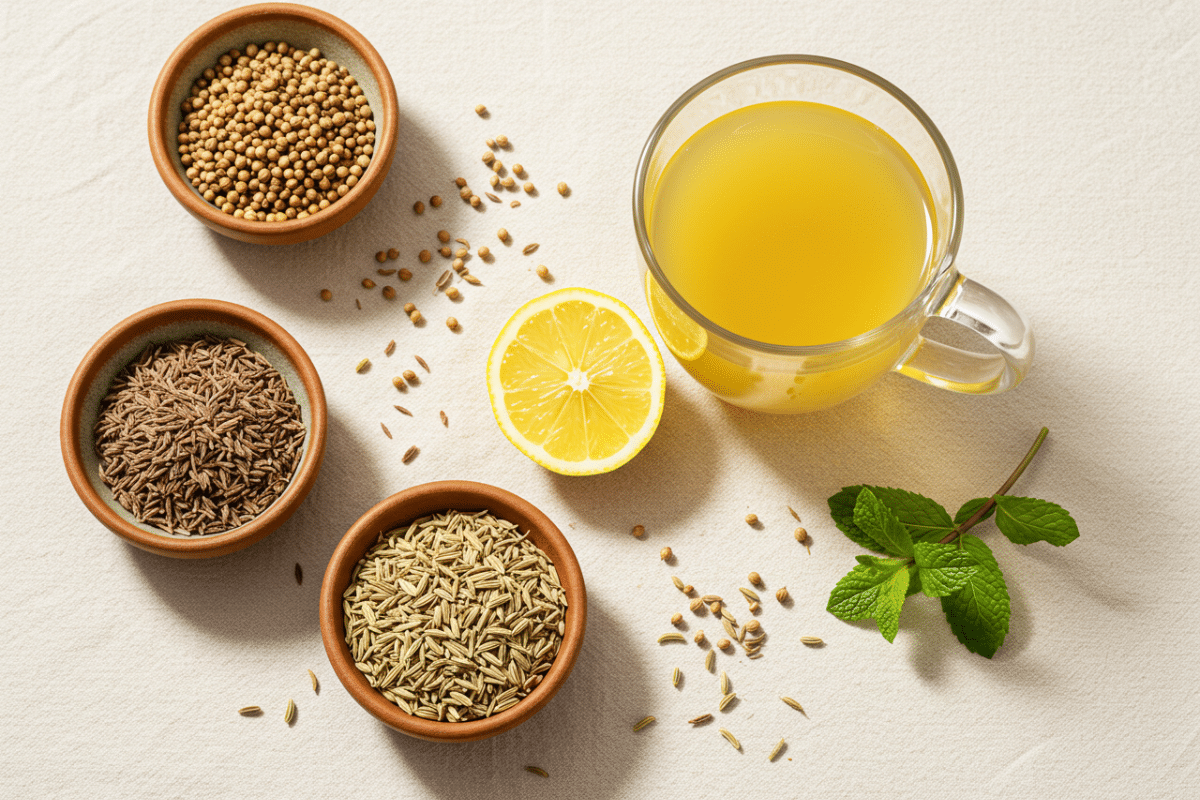Tea fennel coriander cumin recipe is a warm, aromatic blend that brings simple comfort to any moment of the day. Made with three everyday spices—cumin, coriander, and fennel—it’s a grounding herbal drink with a naturally cozy flavor. This easy recipe shows you how to toast, simmer, and infuse the seeds for a soothing cup you can enjoy morning or night. And if you love gentle, homemade herbal blends, you might also enjoy my Lemon Balm Tea Recipe for Weight Loss.
Table of Contents
Why You’ll Love This Tea Fennel Coriander Cumin Recipe
A Comforting, Digestive-Friendly Blend
This warm Ayurvedic-inspired tea feels naturally soothing, especially after a long day or a heavy meal. Cumin brings a toasty depth, coriander adds a gentle citrusy note, and fennel offers a sweet, calming aroma. Together, they create a balanced cup many people enjoy for its balanced, comforting feel.
Supports Light, Everyday Wellness Habits
A lot of people like drinking cumin coriander fennel tea when they’re trying to stay hydrated, reduce snacking, or support general wellness. It’s a simple daily ritual that fits naturally into a balanced lifestyle. If you enjoy tea blends for mindful eating or gentle wellness goals.
A Calming, Grounding Ritual
Beyond the flavor, the process itself is relaxing. Toasting the seeds, simmering them slowly, and inhaling the warm herbal aroma creates a cozy moment of self-care—perfect for unwinding anytime you need a quiet reset.

Safe and Simple
This tea is naturally caffeine-free, gluten-free, and dairy-free. With just three basic spices and a few optional add-ins, it’s a quick, simple blend you can prepare even on busy mornings.
A Naturally Refreshing Ritual
Many people love this tea not just for its comforting taste, but also for how balanced and refreshed it makes them feel. The warm spices and gentle aroma create a soothing experience that can support your overall sense of well-being.
Ingredient Deep Dive
Let’s explore what makes this blend of cumin, coriander, and fennel so special—not just in flavor, but in the comforting experience it creates. These three simple spices work beautifully together and have been used in traditional preparations for generations.
Cumin Seeds: Warm and Earthy
Cumin brings a warm, slightly nutty flavor that forms the foundation of this tea. In Ayurveda, cumin is traditionally appreciated for its grounding qualities and its ability to support a balanced, comfortable feeling after meals.
Coriander Seeds: Bright and Citrusy
Coriander adds a gentle citrus-like aroma that lightens the blend. Many people enjoy coriander for its refreshing, calming character, and it contributes a smooth, rounded taste to the tea.
Fennel Seeds: Naturally Sweet and Aromatic
Fennel is the sweet, soothing note in this trio. Its aromatic profile makes the tea feel softer and more comforting. It’s often used in traditional herbal blends for its pleasant taste and gentle, relaxing scent.
If you want to explore more about how fennel is commonly used, WebMD has a helpful general overview
Optional Add-Ins: Customize Your Cup
You can personalize the tea with simple additions such as:
- Fresh Ginger: Adds warmth and a spicy kick.
- Honey or Maple Syrup: A touch of natural sweetness.
- Lemon or Lime: Brightens the flavor with a clean, citrusy finish.
This trio of spices forms what many refer to as CCF tea—a classic Ayurvedic blend enjoyed for its simplicity, balance, and comforting flavor.
The Secret to the Perfect Tea Fennel Coriander Cumin
Mastering this simple tea is all about bringing out the natural aromas in each seed. That’s where the real magic—and the comforting flavor—begin.
Step One: Toast the Seeds for Depth
Toasting cumin, coriander, and fennel seeds in a dry pan for just a minute or two transforms them. The heat releases their essential oils, creating a warm, nutty, aromatic scent. You’ll know they’re ready when the fragrance becomes rich and inviting.
Step Two: Lightly Crush to Release Aroma
After toasting, gently crush the seeds. This helps the hot water reach the inner layers of each spice and enhances the infusion. If you don’t have a mortar and pestle, using the back of a spoon on a cutting board works perfectly.
Step Three: Simmer, Don’t Boil Hard
Place the crushed seeds back into the pot, add water, and bring it just to a boil. Then reduce the heat and let it gently simmer. This slow, steady infusion draws out the full flavor without turning the tea bitter. A gentle simmer keeps the taste smooth and balanced.
Step Four: Personalize with Add-Ins
If you’d like, add fresh ginger during the simmering step for a bit of warmth. Honey or maple syrup can soften the earthy notes, and a squeeze of lemon brightens the entire cup. Each addition adds its own character, letting you tailor the tea to your mood.
This method is simple, traditional kitchen wisdom—easy, mindful, and perfect for creating a cozy homemade tea ritual.
Step-by-Step Instructions
Let’s walk through each step of making this fennel coriander cumin tea at home. These aren’t just directions—they’re small, calming rituals that make the process feel grounding and intentional.
1. Toast the Seeds
Place the cumin, coriander, and fennel seeds in a dry saucepan over medium heat. Stir gently for 1 to 2 minutes. You’ll notice a warm, earthy aroma as the seeds heat up—this toasting step helps bring out their natural fragrance and builds the base of the tea’s flavor.
2. Crush for Better Infusion
Transfer the toasted seeds to a mortar and pestle and crush them lightly until they’re just cracked open. No need to grind them finely—just opening the seeds helps release more aroma into the tea.
No mortar? Press them gently with the back of a spoon on a cutting board. This simple step helps deepen the flavor of the infusion.

3. Simmer with Water
Place the crushed seeds back into the saucepan and pour in 3 cups of water. If you’re adding fresh ginger, include it now. Bring the mixture to a gentle boil, then reduce the heat and let it simmer slowly. As it cooks, the water will take on a warm golden color and a comforting aroma.
4. Steep and Infuse
Let the tea simmer uncovered for 10 to 15 minutes. This gives the spices time to fully release their flavor. The longer it simmers, the richer and more aromatic the tea becomes.
5. Strain for Clarity
Carefully strain the tea through a fine-mesh sieve into your favorite mug. Discard the solids. You’ll be left with a clear, golden infusion that’s simple and beautiful.
6. Customize and Sip
Add a little honey or maple syrup if you enjoy sweetness, and finish with a squeeze of lemon or lime for brightness. Sip it warm and take a moment to enjoy the cozy, earthy flavors.
Variations & Add-ins
This tea fennel coriander cumin recipe is wonderfully versatile. You can tailor it to your tastes, mood, or even the season. Here are some simple, delicious ways to make it your own.
Ginger-Spiced Version
Add a 1-inch piece of thinly sliced fresh ginger to the simmering water. Ginger brings a warm, zesty kick that pairs beautifully with the spices and makes the tea feel extra cozy—especially in cooler weather.
Sweet and Comforting
If you prefer a touch of sweetness, add a drizzle of honey or maple syrup after straining. These natural sweeteners round out the earthy flavors and make each sip feel smooth and soothing.
Bright Citrus Twist
Add a wedge of lemon or lime just before serving for a fresh, uplifting finish. The citrus adds brightness and enhances the overall flavor of the tea.
Cooling Summer Version
To enjoy this drink chilled, let the strained tea cool to room temperature, then refrigerate it. Serve over ice with a twist of lime for a refreshing warm-weather version.
If you enjoy cooling drinks, you might also like this simple cucumber mint lemonade recipe.
Herbal Infusions Options
Experiment by adding a pinch of tulsi (holy basil), a few mint leaves, or even a bit of dried chamomile during the simmer. Each herb brings its own unique aroma and flavor—mint adds coolness, tulsi adds warmth, and chamomile lends a soft floral note.
Final Note
These variations keep your tea experience fun and customizable, letting you enjoy a slightly different cup each time.
Serving and Storage Tips
Best Time to Enjoy
Tea fennel coriander cumin can be enjoyed any time of day. Many people like it warm in the morning as a gentle start or in the evening as a calming part of their routine. Sip it whenever you want something warm, aromatic, and soothing.
How to Serve
Serve the tea warm in your favorite mug or insulated flask.
If you’re adding lemon or sweeteners, mix them in after straining for the freshest taste.
This tea pairs beautifully with light meals or snacks, such as this Greek yogurt cucumber salad
Make-Ahead Tips
You can easily make a larger batch by doubling or tripling the ingredients.
After straining, store the tea in a sealed glass jar or bottle in the refrigerator.
It will stay fresh for up to 3 days.
How to Reheat
Warm the tea gently over low heat—avoid boiling to keep the flavors delicate.
You can also enjoy it chilled or poured over ice for a refreshing cool version.
What Not to Do
Avoid storing the tea with the seeds still inside, as the flavor may become too strong.
Always strain before refrigerating for the best taste and clarity.

Tea Fennel Coriander Cumin
Ingredients
- 1 teaspoon Cumin Seeds
- 1 teaspoon Coriander Seeds
- 1 teaspoon Fennel Seeds
- 3 cups Water
Optional Add-ins:
- 1- inch piece Fresh Ginger thinly sliced
- 1 teaspoon Honey or Maple Syrup to taste
- 1 wedge Fresh Lemon or Lime
Instructions
- Toast the Seeds: Place the cumin, coriander, and fennel seeds in a small, dry saucepan over medium heat. Toast for 1–2 minutes, stirring constantly, until they become fragrant.
- Lightly Crush the Seeds: Remove from heat and gently crush the seeds using a mortar and pestle or the back of a spoon.
- Simmer the Tea: Return the crushed seeds to the saucepan, add water and optional ginger. Bring to a boil, then reduce to a low simmer.
- Steep for Potency: Simmer uncovered for 10–15 minutes.
- Strain and Serve: Pour through a fine-mesh sieve into mugs, discarding the solids.
- Customize and Enjoy: Add honey or maple syrup for sweetness and finish with a squeeze of lemon or lime. Enjoy warm.
Notes
Conclusion
This tea fennel coriander cumin recipe is more than just a warm drink—it’s a cozy daily ritual inspired by centuries of Ayurvedic tradition. With simple ingredients and an easy preparation method, it brings together comforting aromas and a grounding moment you can enjoy anytime.
Whether you’re new to herbal teas or looking to add a soothing, flavorful blend to your routine, this three-seed infusion is a lovely option. Start with a small batch, sip it slowly, and notice how the warmth and aroma make you feel.
I’d love to hear how your cup turns out—share your experience in the comments below! And if you enjoy gentle, aromatic recipes like this, explore more comforting drinks on EasilyMeal.
FAQ
Is it okay to drink CCF tea every day?
Many people enjoy CCF tea regularly as part of their routine. If you have any health conditions, are pregnant, breastfeeding, or take medication, it’s best to check with a healthcare provider first.
Does CCF tea help with weight loss?
CCF tea can be a pleasant, warming drink to include in a balanced lifestyle. It isn’t a weight-loss treatment, but some people enjoy it as a supportive part of their wellness habits.
When is the best time to drink cumin coriander fennel tea?
There’s no strict rule—some prefer it in the morning, others after meals, and many enjoy it simply as a calming beverage throughout the day.
Who should avoid CCF tea?
Because everyone’s body and health needs are different, it’s a good idea to consult a healthcare professional before drinking herbal teas regularly, especially if you:
– are pregnant or breastfeeding
– take prescribed medications
– have specific health conditions
– have allergies to herbs or spices
Can I use ground spices instead of whole seeds?
Whole seeds give a clearer flavor and cleaner infusion, but ground spices work in a pinch. Just note that they may make the tea appear cloudier.
Are there any side effects to be aware of?
Herbal teas made with culinary amounts of spices are generally well-tolerated for most people. If you have allergies, sensitivities, or underlying conditions, or if you are pregnant or breastfeeding, a healthcare provider can help you determine what’s right for you.
Medical Disclaimer
The content of this article is for informational and educational purposes only. It is not intended to be a substitute for professional medical advice, diagnosis, or treatment. Always seek the advice of a qualified healthcare provider with any questions you may have regarding a medical condition. Do not disregard professional medical advice or delay in seeking it because of something you have read on this website.





